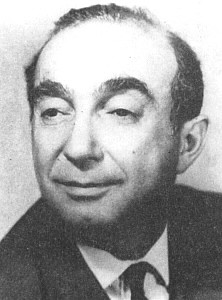After extensive musical education, Karel Berman started his career as a bass singer of opera in Opava. In March, 1943, Berman was deported to Theresienstadt, where he took part in cultural life as a singer, composer and director. On 11 July 1944, for example, he and Rafael Schächter produced the "Four songs to words of Chinese poetry" by Pavel Haas for the first time. In 1944 he composed Suite Terezin in three movements ('Terezin', 'Horror', and 'Alone'); a work which musicologist Bret Web described as "a rare in situ tone portrait of life in a Nazi camp".
Later he was also imprisoned in Kaufering and Auschwitz. He survived the camps and later became famous as an opera singer. In 1953, he joined the Prague National Theatre opera. Berman is also remembered as an opera director, having directed more than 70 operas. He taught at the Prague Conservatory from 1961–71, and from 1964 at the Academy of Performing Arts in Prague.
See the list of Berman's works here.
Full biography at "the Music and the Holocaust" website.




